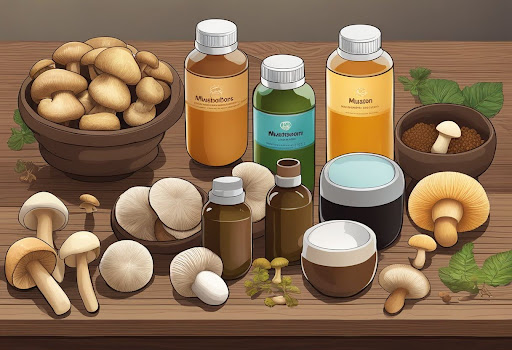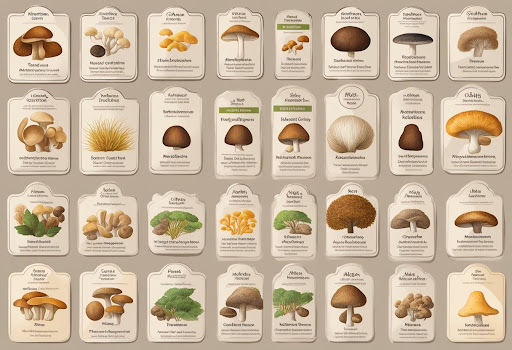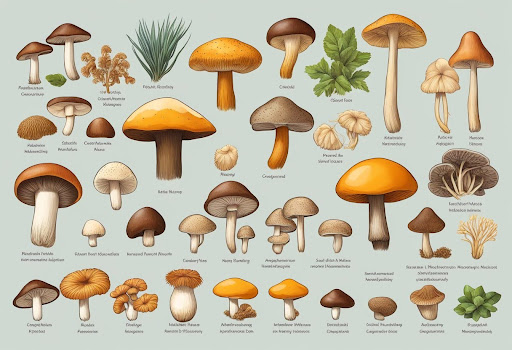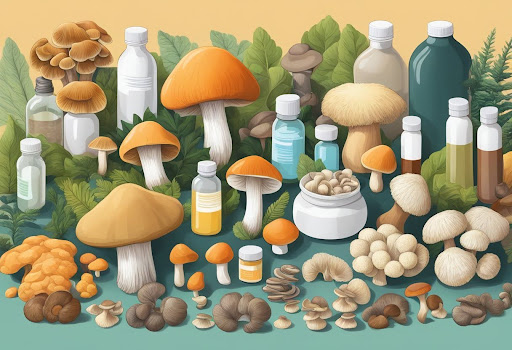
Types of Mushroom Health Supplements: Unveiling Nature’s Secret Wellness Boosters
Mushroom supplements have surged in popularity, with many people turning to these natural products for their purported health benefits. These supplements are derived from medicinal mushrooms, which are celebrated for their potential to support the immune system among other health-promoting properties. They come in various forms, from powders and capsules to coffee alternatives, catering to diverse preferences and lifestyles.
Each type of medicinal mushroom carries its unique set of benefits. For example, Lion’s Mane is renowned for its cognitive and neurological support, while Chaga is prized for its antioxidant content and digestive health benefits. Incorporating these supplements into one’s daily routine is seen by some as a natural way to enhance overall well-being.
People seeking to elevate their health naturally often look to mushroom supplements as a solution. Amidst the vast array of options, they may find products that promise to offer energy, mental clarity, or stress relief. As the array of mushroom-based supplements expands, they present an intriguing frontier in the pursuit of holistic health, capturing the interest of those looking to support their body’s systems through the power of fungi.
Understanding Mushroom Supplements

When exploring the world of mushroom health supplements, one will find an array of varieties each with unique active ingredients that offer a range of health benefits. Mushroom supplements are derived from fungi that are believed to offer nutritional and medicinal value, often consumed to support overall well-being.
Varieties and Species
The market is filled with a range of mushroom species, each known for distinct benefits:
- Shiitake: Rich in vitamins and known to support immune function.
- Reishi: Often used to promote relaxation and enhance immune health.
- Cordyceps: Sought after for energy enhancement and potential athletic performance improvement.
- Lion’s Mane: Believed to support cognitive health and nerve growth.
- Chaga: Noted for its antioxidants and support of immune function.
- Maitake: Known for supporting weight management and healthy blood sugar levels.
- Turkey Tail: Recognized for its immune system boosting properties.
- Oyster & Enoki: Contain significant levels of fiber and protein.
- Cremini & Portobello: Rich in B vitamins and minerals.
- Chanterelle: Appreciated for its vitamin C and potassium content.
These species are commonly available either as powders or extracts, making their incorporation into a daily routine quite easy for individuals.
Active Ingredients
The potency of mushroom supplements is largely due to their bioactive compounds, which include:
- Polysaccharides: Such as beta-glucans, known for immune-boosting properties.
- Triterpenes: Found in Reishi, which may offer calming effects and support for the body’s response to stress.
- Antioxidants: Protect cells from damage and are abundant in species like Chaga.
- Vitamins & Minerals: Mushrooms are a natural source of B vitamins and essential minerals like selenium.
- Phytonutrients: Present in mushrooms, these may offer protective health benefits.
Each mushroom type has a unique profile of these ingredients that contribute to their proposed health benefits. When choosing supplements, it is essential for one to consider not only the type of mushroom but also the specific components that align with their health goals.
Health and Wellness Benefits

Mushroom supplements are increasingly recognized for their potential to enhance overall health and wellness. Rich in vital nutrients and unique bioactive compounds, these supplements offer a diverse range of benefits that target various aspects of the body’s functioning.
Immune Support and Antioxidants
Mushrooms are a powerhouse of immunomodulators and antioxidants. They enhance the body’s immune system by increasing the production of immune cells and regulating their activity. For instance, the beta-glucans found in mushrooms like Shiitake and Maitake have been shown to strengthen the body’s defenses against pathogens. The antioxidants present help combat oxidative stress, which is linked to numerous chronic diseases.
Cognitive Function and Brain Health
Certain mushrooms, particularly Lion’s Mane, contain compounds that stimulate the production of nerve growth factor—critical for maintaining brain health. They have been associated with improvements in memory, mental clarity, and cognition. Regular consumption of these supplements may contribute to enhanced focus and concentration, potentially offering a natural solution for those looking to boost their cognitive function.
Physical Health and Performance
Mushroom supplements are believed to impact physical health and athletic performance positively. They may improve energy production by supporting mitochondrial function and ATP synthesis. Additionally, there is evidence to suggest that they could aid in exercise performance—optimizing endurance and even supporting healthy blood pressure levels. Cordyceps, for instance, is often used by athletes for these very reasons.
Stress and Emotional Well-being
The role of mushroom supplements in managing stress and promoting emotional well-being has garnered attention. They seem to possess adaptogenic properties, which may help the body cope with anxiety and depression, and even improve sleep quality. Users often report a sense of elevated mood and mental balance, pointing to a holistic approach to tackling emotional challenges.
Microdosing Mushrooms

Microdosing mushrooms refers to the practice of consuming very small, sub-hallucinogenic amounts of psilocybin mushrooms. Traditionally associated with the enhancement of cognitive function, creativity, and emotional wellbeing, microdosing aims to elicit benefits without the intense experience of a full psychedelic trip.
Mushrooms Used for Microdosing:
- Psilocybe cubensis
- Psilocybe semilanceata
- Other psilocybin-containing mushrooms
Dosage and Method: The typical microdose mushroom ranges from 0.1 to 0.5 grams of dried mushrooms. It is advised to start small to gauge personal sensitivity and adjust accordingly.
Schedule: A common protocol involves a dosage day followed by a couple of days off. For example:
- Day 1: Microdose
- Day 2: Transition day
- Day 3: Normal day with no dosing
- Day 4: Microdose again
Health Benefits Claimed:
- Increased focus and concentration
- Reduced anxiety and depression
- Enhanced emotional balance
- Improved creativity
Safety and Legality: Those considering should be aware of local laws, as psilocybin is illegal in many regions. Furthermore, one should consult with a healthcare provider before starting, especially when considering potential interactions with medications or pre-existing conditions.
For high-quality microdosing products in Canada, one might find what they’re looking for at companies specializing in these types of supplements like Microdose Mushrooms Canada, which ensure that customers have access to safe and reliable options.
Common Misconceptions:
- Microdosing does not mean daily consumption.
- It is not a fast track to ‘enlightenment’ or a miracle cure.
In summary, while microdosing mushrooms is growing in popularity, particularly among those seeking alternative health solutions, it is essential to approach this practice with caution, armed with accurate information, and a firm understanding of one’s own health and local regulations.
Applying Mushrooms in Daily Life

Incorporating mushrooms into daily routines can benefit one’s health, offering vital nutrients and a host of medicinal advantages. They serve not only as a versatile food but also as a supplement, available in various forms to cater to different preferences and needs.
Dietary Integration
Mushrooms are a culinary favorite, easily added to dishes to enhance flavor while providing significant health benefits. They are rich in vitamin D, selenium, vitamin B6, niacin, and potassium, making them a nutritious addition to any meal. One can enjoy mushrooms raw in salads, sautéed as a side dish, or used as a meat substitute in recipes for their earthy umami. As a medicinal food, incorporating mushrooms like shiitake or maitake can contribute to a stronger immune system and better overall wellness.
- Salads: Raw mushrooms can be thinly sliced for freshness and crunch.
- Sautéed: Quick and easy, sautéing mushrooms unlocks their flavor.
- Meat substitute: For vegetarian options, mushrooms’ texture makes them ideal.
Supplement Formats and Use
Mushroom supplements come in various formats, such as capsules, powders, and tinctures, each containing functional mushrooms, mycelium, or fruiting bodies known for their health-promoting properties. These concentrated forms ensure an intake of nutrients like zinc, which supports the immune system, without having to consume large quantities of the mushrooms themselves. One can find supplements tailored for medicinal purposes, such as enhancing cognitive function or alleviating stress. Mushroom tea is another popular option, offering a soothing way to enjoy the benefits.
Capsules: Convenient and measured doses of mushroom extract. Powders: Versatile for blending into smoothies or food. Tea: A gentle method to consume mushrooms while enjoying a warm drink.
Integrating mushrooms into one’s diet or supplement routine can be a simple yet effective way to harness their natural power for health improvement.
Scientific Research and Studies

Mushroom health supplements have gained attention in scientific circles for their potential in preventing diseases and bolstering gut health. Recent biomedical research and clinical trials shed light on how mushrooms might offer immune support and provide antioxidants and polyphenols that are critical to maintaining wellness.
Cancer and Disease Prevention
In the realm of cancer prevention, mushrooms have been a focal point due to their bioactive compounds. Clinical studies suggest that these bioactive compounds can stimulate the activity of immune cells and potentially halt the growth and spread of cancer cells. Mushrooms’ antioxidants also play a role in reducing oxidative stress, which is linked to various chronic diseases. Specifically, these studies delve into the effects of mushrooms on reducing inflammation and the risk of plaque buildup in the arteries, which can lead to hypertension.
- Biomedical Research Highlights:
- Activity stimulation of macrophages and free radicals to prevent cancer spread.
- Possible reduction in hypertension due to antioxidant effects.
- Studies: Animal and cell-based research, pending further human clinical trials.
Gut Health and Microbiome
When it comes to gut health, mushrooms are thought to offer unique benefits. They contain components that may positively influence the microbiome, the vast community of microorganisms residing in the gut. This is vital as a healthy gut microbiome is linked to reduced inflammation and improved overall health. Additionally, there is a growing interest in the role of edible mushrooms as a supplement to lower blood pressure and sodium intake by providing a savory flavor that reduces the need for salt in diets.
- Microbiome-focused Studies:
- Investigation into mushrooms’ impact on gut microbiota diversity and inflammation.
- Potential for mushrooms to assist in balancing gut equilibrium and immune support.
The research underscores the significance of pursuing rigorous clinical trials to confirm these health benefits, ensuring people can add mushroom supplements to their regimens with clear expectations and safe outcomes.
Availability and Choices

When one embarks on the journey through the diverse world of mushroom health supplements, they are met with a vast array of choices, both in types and price points, reflecting market trends and a rich tapestry of geographical origins.
Comparing Types and Prices
Mushroom health supplements come in a multitude of forms, ranging from capsules and powders to coffee alternatives. A standout option in the market is Solaray’s Fermented Mushroom Complete, often celebrated for its comprehensive blend. On the other end of the spectrum, one finds NOW Cordyceps, presenting itself as a terrific value proposition. For enthusiasts leaning towards powders, Om Mushroom Master Blend is a common choice, while Real Mushrooms Lion’s Mane Powder tailors to those preferring a single-ingredient focus.
The price of these supplements can vary widely. Capsules like FreshCap Ultimate Mushroom Complex, recognized for their broad-spectrum assortments, are generally affordable and accessible. However, for a more budget-friendly entry, consumers can explore supplements like NOW Cordyceps, which strike a balance between quality and cost-efficiency.
| Product Type | Average Price Range | Note |
| Multi-Ingredient Capsules | $20 – $40 | Broad-spectrum benefits |
| Single-Ingredient Powders | $15 – $35 | Focus on specific outcomes |
| Mushroom Coffee Alternatives | $10 – $30 | Blend of stimulation and benefits |
Geographical Origins
The mushroom species utilized in supplements often trace back to distinctive regions that imbue them with particular qualities. Lion’s Mane, a species frequently touted for its cognitive benefits, largely hails from North America and Japan, regions known for their pristine environments conducive to mushroom growth. Varieties such as Cordyceps and Reishi have roots in different parts of Asia and are associated with a myriad of purported health benefits, from boosting immunity to managing stress.
Consumer preference and availability often fluctuate with these geographical nuances, as certain regions gain acclaim for their specialized mushroom types. The market has seen an inclination towards supplements derived from these well-regarded locales, with consumers willing to invest a bit more in products sourced from these particular areas.
In essence, a health-seeker’s choice in mushroom supplements is informed by a delicate balance of type, price, and origin. Whether one seeks to elevate their cognitive routine with premium Lion’s Mane from North American forests or fortify their immune system with Asian-sourced Reishi, the options are both abundant and tailored to individual needs and contexts.
Safety and Side Effects

When it comes to the safety of mushroom health supplements, most are considered safe for the average adult when used appropriately. However, just like any dietary supplement, they can come with potential side effects that vary depending on the type of mushroom and the individual’s health status.
Some common side effects include:
- Allergic Reactions: Rare but possible, including symptoms like itching or rash.
- Gastrointestinal Distress: Some individuals may experience bloating, gas, or discomfort.
- Blood-Thinning Effects: Particularly important for those on anticoagulant medications.
- Autoimmune Disorders: There may be potential interactions if one has an autoimmune condition.
Before starting any supplement regime, one should always consult with a healthcare provider, especially if they are pregnant, nursing, or have existing health concerns.
Drug Interactions: It’s crucial to be aware of how mushroom supplements might interact with other medications. For instance, mushroom types like Reishi have properties that could interfere with certain drugs.
Lastly, the quality of mushroom supplements varies widely in the market. Ensuring they come from reputable sources is essential to minimize the risks of contamination.
To sum up, while mushroom supplements can provide various health benefits, individuals should approach them with an informed and cautious mindset, recognizing the importance of being aware of potential side effects and the necessity of high-quality sourcing.







